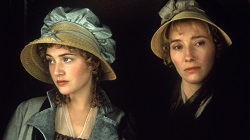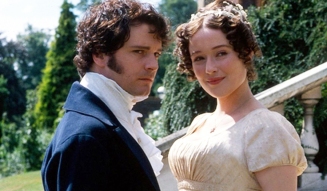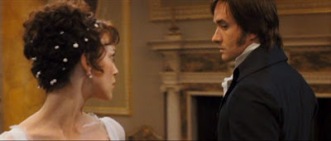
I bet you know a few of Jane Austen’s opening lines. Critics will tell you the first sentence of a novel is crucial, even in a world where readers are browsing in the book stores and picking up books at random less and less. Today’s online buyer will typically select the genre and category before they start browsing. Then the cover and the blurb will entice. Some buy without reading a sample, but many others do. Experts say that the purpose of the first sentence is to convince a reader to read the second and then the third and so on.
I would argue that reading the first sentence is important to begin the emotional journey the reader has with the characters. In the 21st century, characters is what sells a book, not the setting or theme.
How does Jane Austen hold up to that demand?
Sense and Sensibility: The family of Dashwood had been long settled in Sussex.
Pride and Prejudice: It is a truth universally acknowledged, that a single man in possession of a good fortune, must be in want of a wife.
Mansfield Park: About thirty years ago Miss Maria Ward, of Huntingdon, with only seven thousand pounds, had the good luck to captivate Sir Thomas Bertram, of Mansfield Park, in the county of Northampton, and to be thereby raised to the rank of a baronet’s lady, with all the comforts and consequences of an handsome house and large income.
Emma: Emma Woodhouse, handsome, clever, and rich, with a comfortable home and happy disposition, seemed to unite some of the best blessings of existence; and had lived nearly twenty-one years in the world with very little to distress or vex her.
Persuasion: Sir Walter Elliot, of Kellynch Hall, in Somersetshire, was a man who, for his own amusement, never took up any book but the Baronetage; there he found occupation for an idle hour, and consolation in a distressed one; there his faculties were roused into admiration and respect, by contemplating the limited remnant of the earliest patents; there any unwelcome sensations, arising from domestic affairs changed naturally into pity and contempt as he turned over the almost endless creations of the last century; and there, if every other leaf were powerless, he could read his own history with an interest which never failed.
Northanger Abbey: No one who had ever seen Catherine Morland in her infancy would have supposed her born to be an heroine.
Lady Susan: MY DEAR BROTHER,—I can no longer refuse myself the pleasure of profiting by your kind invitation when we last parted of spending some weeks with you at Churchhill, and, therefore, if quite convenient to you and Mrs. Vernon to receive me at present, I shall hope within a few days to be introduced to a sister whom I have so long desired to be acquainted with.
Well, if you can see that very few of Austen’s books begin with anything that connects to a character, let alone the protagonist, what is the purpose of her opening lines?

Sense and Sensibility rapidly opens with the death of the patriarch and the history of wills which leaves the females in such dire straits. We know they will soon have to leave Norland–unless their brother asks them to stay. Elinor then meets and falls in love with Edward and there’s a shred of hope that the distress of losing their father will lead to an unexpected blessing. The real turning point in the story happens when they leave Norland. There’s no going back. Life is going to be nothing like it was before. In this case, the opening sentence sets up the old world and lets us know that it is likely to forever change. Austen suggests the conflict of the story (how do Elinor and Marianne make their way in the world once they are no longer privileged and sheltered at Norland?) from the very beginning.


Again, in Pride and Prejudice, we get the crux of the conflict immediately. Whoever thinks any wealthy unmarried man must be interested in marriage is full of both pride and prejudice. Suggesting it is a universal truth tells us that our characters will be working in a world where this is the basic assumption. We can only expect that any sensible character we would bother liking would reject such a ludicrous idea. However, what will be the ramifications for rejecting such a societal truth? In the end, the interesting fact is that while Elizabeth Bennet wasn’t exactly husband hunting, did she ever consider that a man might be tired of the game? Did Mr. Darcy ever consider that not every lady was playing it as well? Both of them claim to reject the “truth” presented at the beginning and yet they unintentionally prove it.

Mansfield Park gets trickier. Is there a conflict introduced in the first line? No. Is a character introduced? Yes, but she ends up being no one of consequence to the story. In fact, she’s arguably the character with the least impact. The thought of that never ceases to delight me. What is Jane Austen attempting to tell the reader with this beginning sentence? One, it was unlikely that this Maria Ward would obtain the status she did. Very few people live as an island. No, they have relations. These lower relations are now thrust into a baronet’s orbit. We must read the second sentence to gain more information.
She had two sisters to be benefited by her elevation; and such of their acquaintance as thought Miss Ward and Miss Frances quite as handsome as Miss Maria, did not scruple to predict their marrying with almost equal advantage.
Ah. Yes, the relations we previously guessed at are sisters. Sisters that are just as beautiful as the first. Did they marry well? If they did not what was it about Maria Ward that gave her advantage? What became of these sisters? We are told this whole thing happened about thirty years ago so what does all of this mean about the present? It is not exactly a gripping opening but does the job in making the reader ask questions and need to read to find the answers.

Jane Austen has famously claimed in a letter that no one will like Emma Woodhouse as a heroine except herself. Here we do meet a character. However, we are told she has nothing to vex her. She seems to have every blessing in life. Let us recall that the typical heroine of the era was more like Fanny Price–innocent but at a disadvantage in some way. The Dashwood sisters and Elizabeth Bennet both suffered financially compared to those that would judge and demean them. Now, we have a woman with every reason for joy and contentment. We can expect she will either have all of that taken away or should be a paragon of virtue with an endlessly charitable heart so we won’t hate her. However, that’s not the Emma Woodhouse we get. Instead, we are told in the fifth sentence that Emma has real evils. She gets her own way and thinks well of herself. The reader can see these are unlikable traits and the added description of pretending as though they are great flaws prejudices the reader even more, in my opinion. What will make the reader continue? Curiosity and a desire for the lady to get her just desserts? Kind hopefulness that even a rich lady can learn to have a more charitable view of the world? We are told what to think about Emma…and yet we are not so certain. The uncertainty impels us to continue. This fits all the more as some literary critics consider Emma the precursor to a mystery novel. The central question in that framework is “Who can Emma marry?” whereas the opening sentence makes us wonder “Who is Emma really?” People are always more than the sum of their appearances to others.
 In Persuasion, we meet Sir Walter Elliot and how well he thinks of his family legacy. Personally, reading the sarcasm about the baronetage hooked me as a reader. I love a book that begins by poking fun of someone or something. I dearly love a laugh! As the chapter continues, we learn that Sir Walter’s family lacks a crucial thing: an heir of his body. We also learn the youngest daughter has married but the two elder ones have not. We then learn that the family is in debt and will need to leave this ancestral home and pride of place. While we do not understand what the conflict of the story is yet, we know the cause of it is this misplaced pride. Ah, but the family is going through a change. Surely they will amend their views and whatever it has cost the heroine will be reversed! Do you see where Austen sneaks in the fact that it won’t be as simple as that? Cleverly, by exposing Sir Walter as so ridiculous in caring about his position in the world, Austen tells the reader that merely reversing the family’s position will not fix the problem for any sensible person doesn’t care about that. It won’t be enough for someone to see that the heroine’s family must no longer have their pride–even if they were capable of letting it go–for that was not the root of the problem on the other side. She slyly tells us there is a dual conflict. Once we get to know Captain Wentworth, it’s easy to see how that’s the case.
In Persuasion, we meet Sir Walter Elliot and how well he thinks of his family legacy. Personally, reading the sarcasm about the baronetage hooked me as a reader. I love a book that begins by poking fun of someone or something. I dearly love a laugh! As the chapter continues, we learn that Sir Walter’s family lacks a crucial thing: an heir of his body. We also learn the youngest daughter has married but the two elder ones have not. We then learn that the family is in debt and will need to leave this ancestral home and pride of place. While we do not understand what the conflict of the story is yet, we know the cause of it is this misplaced pride. Ah, but the family is going through a change. Surely they will amend their views and whatever it has cost the heroine will be reversed! Do you see where Austen sneaks in the fact that it won’t be as simple as that? Cleverly, by exposing Sir Walter as so ridiculous in caring about his position in the world, Austen tells the reader that merely reversing the family’s position will not fix the problem for any sensible person doesn’t care about that. It won’t be enough for someone to see that the heroine’s family must no longer have their pride–even if they were capable of letting it go–for that was not the root of the problem on the other side. She slyly tells us there is a dual conflict. Once we get to know Captain Wentworth, it’s easy to see how that’s the case.

I would not be the first to point out that the traditional heroine of a gothic novel looks more like Eleanor Tilney than Catherine Morland. Austen laughingly points this out right away. Well, if Catherine is not the traditional heroine then who is she? Like Emma, we are introduced to the heroine right away and told what to think about her. It is no wonder that Austen’s working title for this story was Susan and then Catherine. Unlike Emma, we are given a sympathetic view of Catherine. We can’t help but want her to do well in life, even if she doesn’t so desperately deserve it as other heroines do. I think in this way, Northanger Abbey fits as the most modern story. Today’s books quickly introduce the protagonist and convinces us why we should care about him or her. As the story continues, we can see how Mr. Tilney has what Catherine lacks in life and how she can lift his spirits and encourage his sense of humor while preventing him from falling into cynicism.

Lady Susan‘s opening line immediately exposes her selfish and manipulative way. The reader instantly wonders how this family will survive her visit and what this woman will continue to attempt to gain from it.
I have postulated that present-day readers prefer to learn about one of the protagonists . Experts have claimed that the opening line makes the reader continue reading. In some cases, Austen’s lines expose the conflict (S&S, P&P, P). In others, she introduces a character (Emma, NA, P, LS). Another possibility is exposing the setting or theme of the book (S&S, P, LS). Mansfield Park is Jane Austen’s least popular book and by examining the opening line, we might see why. Although it compels the reader to continue to make sense of the importance of the first line it does not introduce a character we can have an emotional reaction to. It does not present a conflict or theme. It’s worth noting that many critics think Mansfield Park is Austen’s greatest work but I would argue that it is also her most subtle. The indifferent beginning continues throughout the work and the true meaning of Austen’s themes, the conflict, the very reason why Fanny is the heroine and not one of her cousins or Mary Crawford all remain mostly hidden in the same way someone may miss the importance of the book’s opening line.


In conclusion, opening lines are pretty crucial for a book. However, a book may be well-written without having a strong opening–if that serves the author’s intent. I like to think that Jane Austen was not surprised when fewer people enjoyed MP than they did her other works. I imagine she knew not many people would see all her deeper meanings and she wanted them to remain hidden as she opened the story in such a way. On the other hand, to become a popular book, you must have a memorable opening. Critics may think Mansfield Park is the superior story but more readers will know Pride and Prejudice‘s opening line.


Wonderful post. Your opening line drew me in!
LikeLiked by 1 person